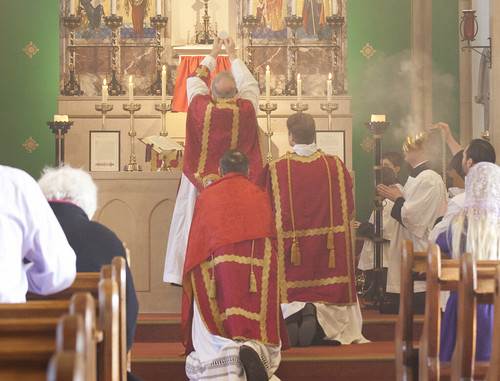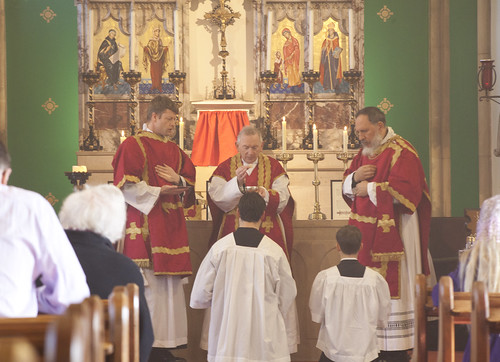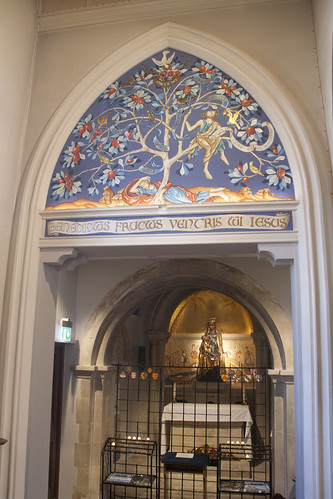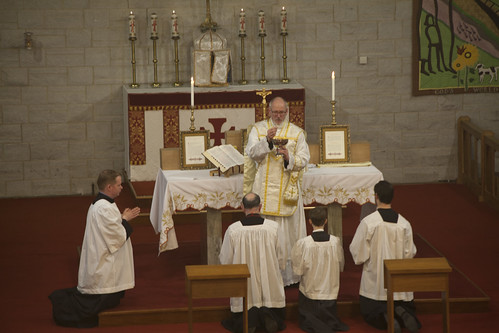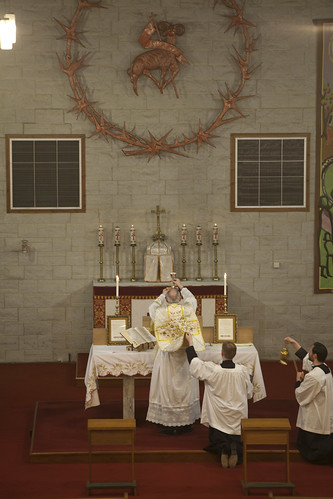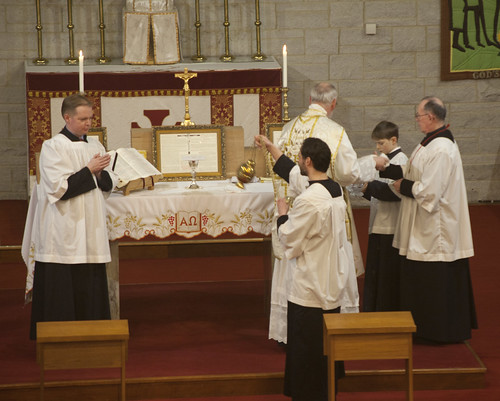Chairman's Blog
The Gospels of the first three Sundays of Lent
 |
| St Paul |
Peter Kwasniewski has an excellent discussion of the contrast between the Epistles (first readings) of the first three Sundays of Lent given us by the ancient Lectionary, and the Second Readings of Sunday Mass, usually Pauline Epistles, offered us by the 1969 Lectionary. Since there are three years of readings in the Ordinary Form there are nine passages to compare with the three of the EF. Not one of these nine passages so much as mentions the major theme of all three of the EF's selections: the importance of repentance from a sinful lifestyle, above all in relation to sexual sins.
So concerned were the compilers of the reformed Lectionary to avoid mentioning sin that they even cut out of the passages bits where the subject came up.
It is a nice illustration of a major strand of what happened in the Catholic Church when the reforms following Vatican II were implemented. Consider this, a passage commenting on yesterday's Epistle by Mgr Patrick Boylan (The Sunday Epistles and Gospels) which had its Imprimatur in 1941.
If there are among us Catholics, apparently convinced and genuine, who seek to minimise the sinfulness of unchastity, or the danger of its occasions, let us not be deceived by their words, nor follow their example. On all sides one hears voices raised against every attempt to check the growth of profligacy, every effort to restrict evil amusements and evil literature. We hear constantly of the 'sacred rights', of freedom--freedom, that is, to disregard the moral code, to follow the blind guidance of passion, to satisfy every form of curiosity, so see everything, to read everything. Popular literature is full of the 'empty words' [St Paul's phrase] with which all that is seductive to sense is represented as innocent because it is 'natural', or 'healthy', or because it 'develops the personality'!
Boylan, and no doubt the majority of his clerical and pious lay readers, was acutely aware of the ferocious assault which was being carried out against traditional sexual mores, a full twenty years before its hideous triumph in the sexual revolution of the 1960s. St Paul's exhortations were exactly what was needed at that time.
It was the moment when things were getting really, really bad--when a bad case of the common problem of all young people since time immemorial was turning into a social revolution which would permanently destroy the expectation of the permanency of marriage and of children being raised by their biological parents--that was the moment when the reformers chose to bury St Paul's message.
Everyone in the West in the middle decades of the 20th century was aware of the increasing gulf between the Catholic Church and the maxims of the world. Everyone was aware that Catholic communities, teachings, culture, and institutions were as a tightly-integrated group the last major refuge of a traditional Christian attitude.
It was for the Second Vatican Council to decide how to address this problem, and the path chosen, as far as anyone could tell through the confusion and chaos, was the path of appeasement. The consequences tell their own tale.
Support the work of the LMS by becoming an 'Anniversary Supporter'.
Letter on older Traditionalists, in the Catholic Herald
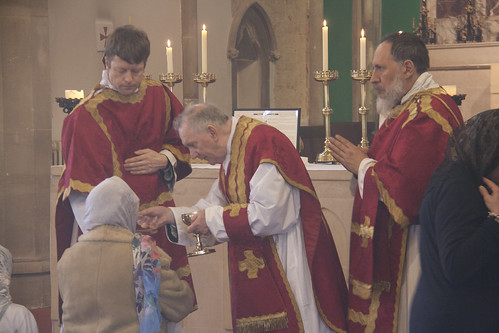 |
| The LMS Pilgrimage to Our Lady of Caversham last weekend. |
Today the Catholic Herald has published my letter answering Michael Davis (not to be confused with the late Michael Davies), who criticised the older generation of Catholics attached to the Traditional Mass.
I have written a blogpost about his article here.
Michael Davis’s attack on the ‘older generation’ of Traditional Catholics (Comment, 16th Feb) misses the mark. The tone of the mainstream lay movement for the preservation of the Traditional Mass, represented by the Latin Mass Society and it sister organisations around the world, was set by men like Dietrich von Hildebrand and Eric de Saventham, both of whom risked their lives for their opposition to Hitler; Hamish Fraser, a convert from Communism; and Hugh Ross-Williamson, deselected as a Labour parliamentary candidate for being too left-wing. The extraordinary devotion of Traditional Catholics to the Papacy, over decades when they received little but hard knocks from the hierarchy, prevented them from taking the easy option of leaving the structures of the Church. Now that their central argument has been vindicated—the ancient Mass was never abrogated—we can see that their obedience to the bishops of their day was supererogatory.
The Traditional Movement today, as Davis notes, contains many young people. Through no fault of their own, a great many come from broken homes, and nearly all from homes where the Faith was scarcely practiced, if at all. They have grown up seeing Tradition vilified, and its rebellious image has proved attractive. If you want to shock ‘boomer’ parents, a mantilla may be more effective than cannabis.
Fortunately, the Traditional Movement has something they not only like—the ancient Mass—but which is an objective channel of grace. It takes seriously the issue of sin. And it hasn’t driven away the older age-groups who can provide example and guidance.
We value the older generation of Catholics attached to the Traditional Mass for their fidelity, for their generosity, for their experience and their wisdom. Of special importance are those who can remember how it was when Tradition was normal: when to be a Traditional Catholic was simply to be a Catholic. I will miss them when they are gone.
Davis mentions the principle that we are obliged to respect our parents. On the basis of this principle I suggest he owes an apology to his often heroic predecessors in the movement for the Traditional Mass.
Yours faithfully,
Joseph Shaw
Chairman, the Latin Mass Society
Support the work of the LMS by becoming an 'Anniversary Supporter'.
Position Paper on the Sanctoral Cycle

Today I publish the last of the FIUV Position Papers: The Sanctoral Cycle of the Extraordinary Form. Go over to Rorate Caeli to read it.
Researching the calendar, specifically the cycle of saints' days, has been very interesting. It has underlined how reletively empty of saints the 1969 calendar is (although the Novus Ordo it has picked up a few more over the decades since then). If you go to a weekday Mass in the Novus Ordo, the priest will more often than not be wearing green, during 'Ordinary' time, or violet in Advent or Lent, or white in Paschal time: the colour of a 'ferial' day, when no feast is being celebrated. I have heard of this being taken even further, and a preference for the ferial Mass taking over even on days when according to the rule there should be a saint. But in the Traditional Mass ferial Masses are downright rare. On the few days each week when there is no saint to celebrate, priests tend to say a Votive Mass.
It is important to understand the rationale behind this preference for ferias. In the EF a succession of ferial Masses would mean a succession of celebrations of the Mass of the previous Sunday (without the Gloria or Creed). Doing this sometimes can be nice, and occasionally the Mass of the previous Sunday may not have been celebrated on the Sunday (for example, the First Sunday after Pentecost is always replaced by Trinity Sunday). But doing this every day of the week would be a bit odd. For those who attend the Traditional Mass either every day or one or two days in a week, Masses are distinguished from each other by the saints and by the Votives chosen by the celebrant. On Fridays we tend to get the Mass of the Sacred Heart; on Wednesdays the Mass of St Joseph (a Mass formulary which isn't used elsewhere in the year, for historical reasons); Our Lady on Saturdays; and so on: these are devotions which will often be marked by statues or side-altars in traditonally-decorated churches. The saints and the Votives slot into our devotional lives: we can read up about the saints and prat to them, we can engage with the devotion celebrated in the Votive Mass. As you become used to the EF, it all slots together.
It is not so in the EF. Why? It was not an accident: Archbishop Bugnini said the fuss about the reform of the sanctoral cycle came from people who had a 'devotional attitude' to the liturgy. He thought that a devotional attitude to the liturgy was wrong. It wasn't, he thought, truly liturgical, and it wasn't truly scriptural. It had to be stripped away to reveal the bare reality of the Mass, like a modernist building with all the pipes showing. On the one hand the worshipper was not to be distracted, more than necessary, by devotions, from the action of the Mass itself. On the other hand, the liturgy would day by day introduce him to reams and reams of scripture, through the 'lectio continua' Lectionary: a Lectionary which, particularly in weekday Masses, plods through the books of both Testaments page by page (leaving out the odd embarassing bit, of course).
As someone who for periods of my life attended daily OF Masses I'd say that the reformed Lectionary does to an extent give one's liturgical experience a both continuity and difference: the readings of today's Mass will very probably continue the story or exhortation or whatever it is of yesterday's. Indeed, the more obscure readings are easier to understand if you've been keeping up. But the saints are rather left out of it. Even when they are celebrated, and the priest is wearing the red of a martyr or the white of confessor, the lectio continua will probably carry on, however innappropriate the reading may be to the saint whose day it is.
I leave it to others to defend the Novus Ordo in more detail. I hardly it necessary to defend the Traditional practice. It is just obvious to those who attend it that the traditional approach, which has been the Church's approach since the early centuries, feeds the spiritual lives of those open to it. The saints are not a distraction from Mass: they accompany us in it, and draw attention to its glories, since it was by it that they were themselves sanctified. The devotions of Massgoers and of the Votive Masses themselves point to Christ present in the liturgy as Our Lady points to the Christ-child in a thousand Rennaissance masterpieces. Why is St Joseph important? Why do we celebrate lots of Votive Mass of Our Lady? Because of their role in relation to Christ. And so it is with every authentic traditional devotion.
I hope this Position Paper, the last (at least
for now) in the series, will help those who are and also those who are not familiar with the Traditional Mass to understand it better, and appreciate it more.
Support the work of the LMS by becoming an 'Anniversary Supporter'.
LMS Pilgrimage to Caversham 2018
On Saturday the Latin Mass Society went on pilgrimage to Our Lady of Caversham, which is always very edifying. It was interesting to see, this year, improvements to the shrine, with a new painted backdrop to the shrine image.
The Pilgrimage usually coincides with the Ember Saturday of Lent: not all pilgrimages can take place in the summer, and the Ember Saturday is something well worth celebrating in a solemn way. However, the Ember day was only commemorated this year, because it was the feast of St Matthias.
St Matthias was chosen, between Ascension and Pentecost, to replace Judas: when the Holy Ghost descended upon them, there was a full complement of Apostles. However, representations of the 12 Apostles tend to leave him out to make room for St Paul, so he can be neglected.
We didn't neglect him this year, however, with a splendid High Mass, celebrated by Fr Anthony Conlon, assisted by Fr James Mawdsley FSSP (deacon) and Fr Gabriel Diaz (subdeacon), and accompanied by the Schola Abelis (chant) and the Newman Consort. The Newman Consort sang John Taverner Kyrie Leroy, Thomas Tallis Mass for Four Voices, and Noel Bauldeweyn Ave caro Christi cara, all of which were lovely.
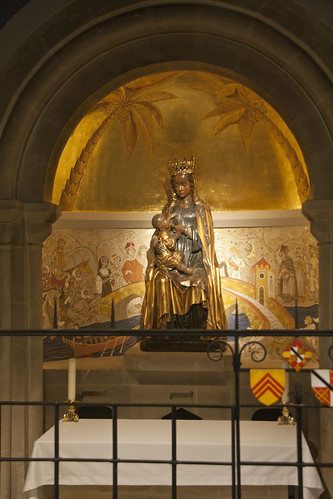 |
| (This is what it looked like last year.) |
This year we had a buffet lunch in the parish room, which was extremely jolly and which we will certainly do again.
With thanks to Mgr Patrick Daly, the parish priest and shrine custodian.
Support the work of the LMS by becoming an 'Anniversary Supporter'.
Mass in Didcot for the Chair of St Peter
Last Thursday was the feast of the Chair of St Peter, and Fr Philip Pennington Harris celebrated it with a Traditional Missa Cantata. It was accompanied by the Schola Abelis of Oxford.
One of the difficulties a priest faces in starting to celebrate the Traditional Mass in a parish is that, if he wants to have sung Masses, both singers and servers are likely to be difficult to find. This can become a chicken-and-egg problem, as sung Masses are in many ways the best way to present the ancient liturgy to those who have not encountered it before. Only if people see how beautiful it can be, will they be motivated to go to great lengths to support it.
The Latin Mass Society is well placed to help in this situation, and singers and servers converged on Didcot from Oxford, Newbury, and London to assist Fr Pennington Harris. In the long term, if the EF continues to be celebrated in the parish, I am sure more local resources will develop. But these things can't be rushed.
Support the work of the LMS by becoming an 'Anniversary Supporter'.
Evangelising the Culture: guest post
Evangelising the Culture: The Great Commission for Traditional Catholics
By Mike Carrol, LMS Representative for Lincolnshire.
 |
| Titian: great art still evangelising after five centuries. Seen by SCT Summer School pupils in 2016. |
It is now ten years since Summorum Pontificum and it is now time for those within the traditional Latin Mass community to collectively use the great virtue of prudence to transmit the message of the Gospel into the culture and society. It is time to evangelise the culture. The great virtue of prudence gives us foresight and the mental and spiritual means of achieving even the most great and overarching goals. After we sanctify ourselves and our families through the Latin Mass, devotions, mortification, and dieing to self by way of The Imitation, we have one Great Commission left which to evangelise. Our traditional message can no longer be kept under a bushel. Christ's light must once again enlighten a society which is groaning under the weight of sin and a dystopian nightmare.
It is now the responsibility of traditionists to evangelise the culture, because since Vatican II we have not collectively as a Church become the Lumen Gentium as was predicted by the council. The great hope was that the faithful would also become 'The Light of the Nations' and that the faith would be transmitted into society from the bottom up, but this never happened.
Firstly there is our personal duty. It has been noted elsewhere that true evangelisation is a consequence not a program. The renewal of the Church, the culture, and our broken society will not come about by plans and structures, but by holiness of life. What is required is the sort of mortifications taught us by St. Thomas A Kempis, St. Francis de Sales, St. Therese of Lisieux and Christ Himself, when He said "Go and sin no more". In order to transmit the Gospel to the men and women of today we must first become a holy people.
Secondly, there are those of an artistic, cultural, and literary ilk whom with great transcendant skills whom, with a girding of grace from God, can transmit great works of literary, cultural, and artistic merit from the top down. The airwaves, the broadcasting media, our libraries, and galleries can be transformed into conduits of God's grace through high artistic endeavours.
As Archbishop Gomez eloquently put it, "Catholicism creates a culture. Catholicism is a way of living born from the encounter with a divine person, Jesus of Nazareth, who is the Word of God and the Son of God humbling himself to come among us in human form. With the incarnation, the world becomes charged with the grandeur of God."
Since the fruits of Vatican II have so far not provided the solutions to transmit the faith into the culture, the responsibility now falls on tradition to enlighten the world and bring Christ to the world once again. This message must be transmitted into the culture from the top down, starting with the high culture.
Archbishop Gomez goes on to say...
"For nearly 20 centuries, the world’s greatest artists were inspired by religious themes. By the search for God in a fallen world and by the great questions of human existence — who are we, where do we come from, why do we suffer and what is it that truly matters?... The people of our times are not satisfied by the temporary consolations and diversions of our consumer, secular society. Their hearts are troubled. They are restless to know that their life has value and meaning. They want to know love and wholeness and community. They want to know that there is something that lies beyond here, something more than this life. So let us pray for artists and writers, students, teachers, critics and readers."
This revolution will only come from individuals and brave souls who are willing to step up to the plate in mortification and from the fullness of grace that flows from tradition and the Latin Mass. It will take courage of individuals, but it is clear that there should now be a clarion call to transmit the goodness, beauty, and truths of Our Lord Jesus Christ into the culture and wider society.
Rosary on the Coast
![]()
Letter from the General Secretary of the Bishops’ Conference of England & Wales, with the good wishes and prayers of Cardinal Nichols for this act of witness, and stating that Mgr. Armitage and Fr. Harries from the two National Shrines of Our Lady have recommended the project, and that the Bishops Conference of Scotland have given it a strong endorsement.
![]()
3 min YouTube with message of support from Bishop John Keenan of Paisley, Scotland
![]()
Interactive map with many locations already registered
![]()
Form to sign up a new Location, and link to sign up for email updates
![]()
Rosary on the Coast logo to use on any local event promotional material
![]()
A schedule of National Preparations from 1st March - Feast of St David, Patron of Wales
Support the work of the LMS by becoming an 'Anniversary Supporter'.
Chartres Pilgrimage: booking open
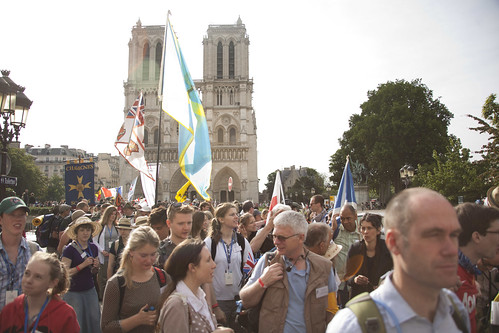 |
| British pilgrims setting off from Notre Dame in Paris in 2014 |
From Francis Carey, Chartres UK.
The 25th British Pilgrimage leaves London on Friday, 18 May 2018 at 7:30 AM. (There will be a Mass of Departure in Westminster Cathedral Crypt at 7:00 AM). The Registration Form (attached/enclosed) should be completed and returned with a deposit of £50 per person to reserve your place. Payment in full by 25 March 2018 (Palm Sunday this year) please. We arrive back in London about 8PM on the following Tuesday, 22 May 2018. Following the Mass before departure; we take the Ferry to France; overnight stay Friday at the Hotel ibis, Aulnay sous Bois; 3 days of Pilgrimage; a hot meal and overnight stay in Chartres (L’Hotel); Mass in Chartres Cathedral Crypt; and return via Eurotunnel to London. We have decided to maintain the cost at £275.00 (£140.00 for Children under 12). Preliminary information is contained in the attached/enclosed sheet.
We will have one Youth chapter (ages 13-30) dedicated to St. Alban and one chapter (Our Lady of Walsingham) for everyone else! Please note that we have been unable to obtain our usual allocation of rooms in our hotel in Chartres and, therefore, there will be very few single rooms available. A single room in the Paris hotel only will be at a supplement of £30.00.
Further information and updates may be posted to our website, www.chartresuk.blogspot.com. Please contact us for any further information on email: Chartres@duc-in-altum.co.uk. We look forward to seeing you on the road to Chartres, Deo volente!
Video from the Institute of Christ the King Sovereign Priest
Support the work of the LMS by becoming an 'Anniversary Supporter'.
An attack on older Traditionalists in the Catholic Herald
I'm cross-posting this from Rorate Caeli.
| Davis in the Catholic Herald |
| 2nd snippet |
| 3rd snippet. |
Support the work of the LMS by becoming an 'Anniversary Supporter'.
Vestment repair day in the LMS Office
From the Guild of St Clare.
--------------------------------------
The Guild of St Clare has been asked to repair some vestments for the Latin Mass Society. These repairs will need to be undertaken in the LMS's office, in central London. We have arranged two dates when we will do this work: the 21st April and the 12th May, between the hours of 10am and 4pm. Lunch will be provided.
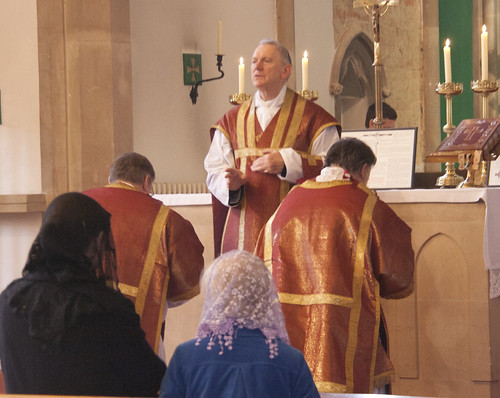 |
| This violet High Mass Set is among the things needing attention |
If you would like to join us, or want to know more about the details, please email me at lucyashaw@gmail.com. Space in the LMS office is fairly limited, so we need to know how many people are planning to come.
The Office is at 11 - 13 Macklin Street LONDON WC2B 5NH
Support the work of the LMS by becoming an 'Anniversary Supporter'.

